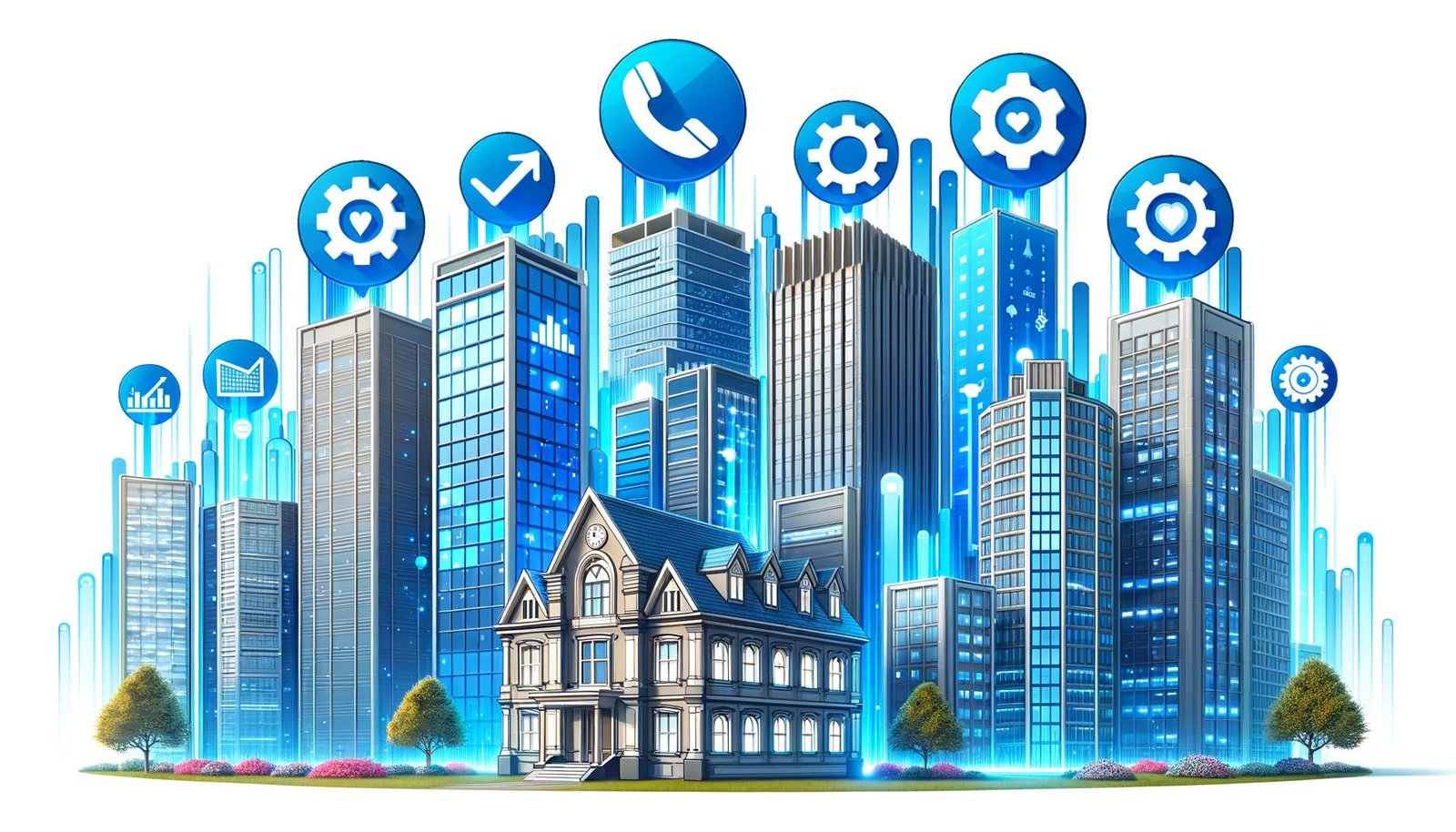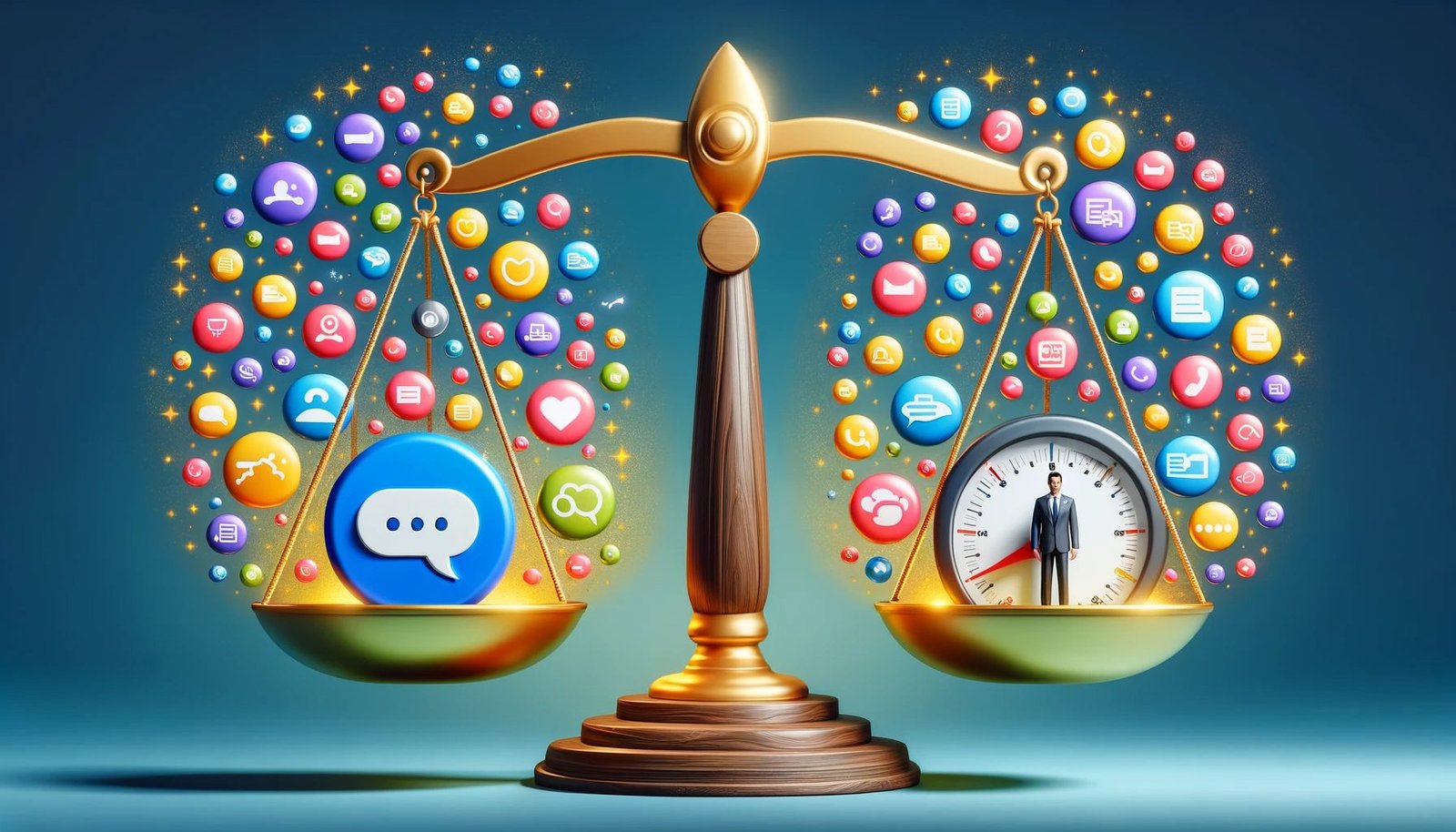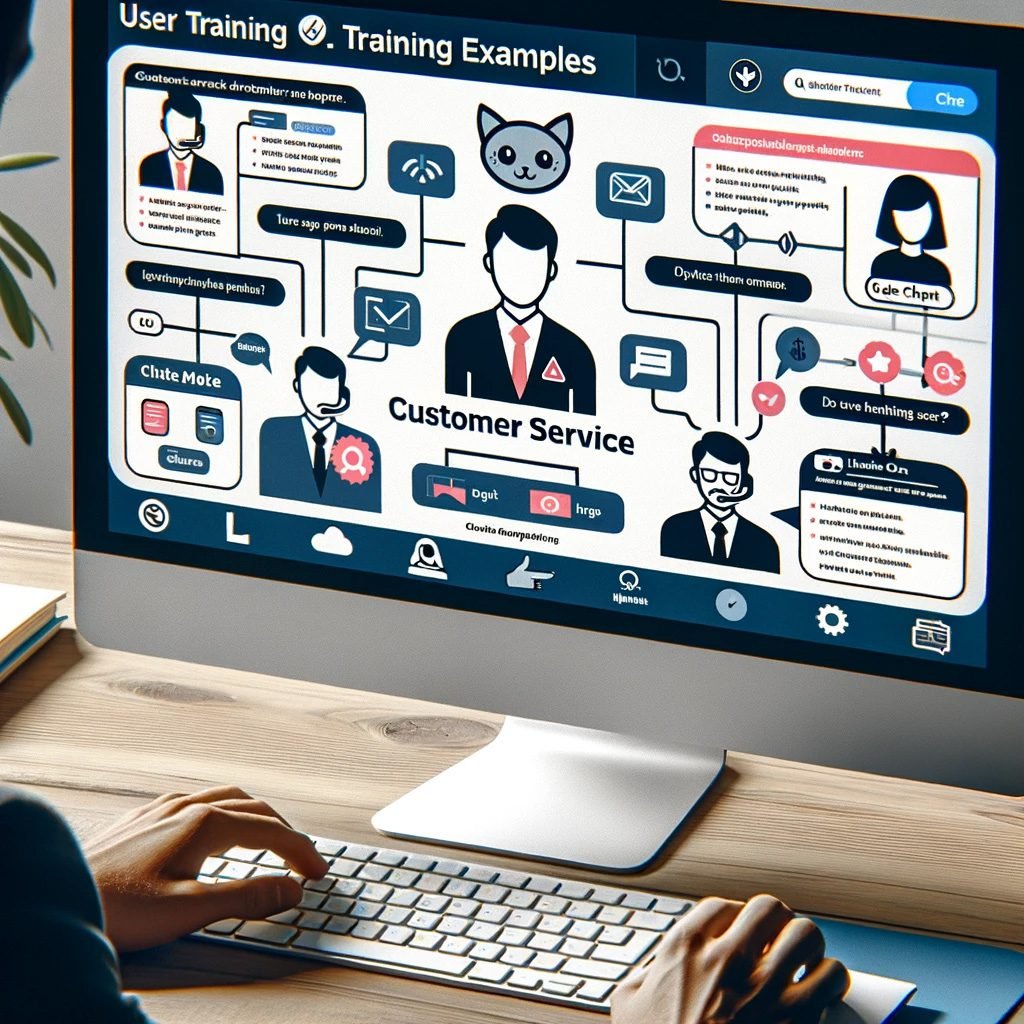CRM Software Alternatives to ChatGPT Customer Service: The Secret Weapon to Improving Your Customer Relationships
CRM Software Alternatives to ChatGPT Customer Service: The Secret Weapon to Improving Your Customer Relationships
Introduction
In today’s fast-paced digital ecosystem, the tools and strategies businesses employ to engage with their customers are in a state of constant flux. As we navigate this ever-evolving landscape, one thing becomes clear: the paramount importance of customer service tools. Enter CRM software, a game-changing solution that’s revolutionizing how businesses interact with their clientele. But what exactly is CRM software, and why is it being hailed as the secret weapon for modern businesses? Moreover, with the rise of conversational AI tools like ChatGPT, how do CRM software alternatives to ChatGPT customer service stand out?
The evolving landscape of customer service tools
The digital age has ushered in a plethora of tools and platforms designed to enhance customer interactions. From chatbots powered by advanced AI like ChatGPT to comprehensive customer relationship management systems, the options are vast and varied. However, with the increasing demand for personalized and instant customer service, businesses are seeking more specialized solutions. This is where CRM software comes into play, offering a holistic approach to managing and optimizing the entire customer journey.
Introducing the concept of CRM software as a secret weapon for businesses
CRM, or Customer Relationship Management software, is more than just a tool; it’s a strategy. It empowers businesses to manage customer interactions, streamline operations, and enhance relationships. With features tailored for everything from sales and marketing to customer support, CRM software is a one-stop solution for businesses looking to elevate their customer service game. In the realm of CRM software alternatives to ChatGPT customer service, there’s a myriad of options that offer unique features and benefits, ensuring that businesses can find the perfect fit for their specific needs. Whether it’s through advanced analytics, automation, or integration capabilities, CRM software is undoubtedly the secret weapon that modern businesses need in their arsenal.
Understanding ChatGPT’s Role in Customer Service
In the rapidly advancing world of customer service, businesses are constantly seeking innovative tools to enhance their customer interactions. Enter ChatGPT, a conversational AI that has been making waves in the realm of customer service. But what exactly is ChatGPT, and how have businesses been harnessing its capabilities for their customer interactions?
A brief overview of ChatGPT and its capabilities.
ChatGPT, a brainchild of OpenAI, stands out as a conversational AI model designed to understand and generate human-like text based on the input it receives. With its advanced algorithms and extensive training data, ChatGPT can comprehend a myriad of queries. This adaptability, combined with its ability to provide real-time responses, has made it an invaluable asset for businesses. From addressing frequently asked questions to guide users through website navigation, ChatGPT has showcased its prowess in various customer service scenarios.
How businesses have been leveraging ChatGPT for customer interactions.
The digital age demands instant responses and round-the-clock availability. Recognizing this, many businesses, from e-commerce platforms to WordPress web development services, have integrated ChatGPT into their customer service frameworks. This integration has empowered them to offer real-time assistance, minimize wait times, and ensure the delivery of accurate information. For instance, an online retailer might deploy ChatGPT to assist customers in order tracking or to clarify return policies. Similarly, a WordPress business website might utilize ChatGPT to guide visitors through its offerings. The versatility of ChatGPT allows it to be customized to the specific needs of each business, solidifying its position as a formidable tool in the CRM software alternatives to ChatGPT’s customer service landscape.

The Need for More: Why CRM Software?
In today’s fast-paced business environment, customer service isn’t just about addressing queries. It’s about building and nurturing relationships, understanding customer needs, and providing a seamless experience across all touchpoints. While conversational AI tools like ChatGPT have revolutionized the way businesses interact with their customers, they are just one piece of the puzzle.
The limitations of relying solely on conversational AI like ChatGPT
ChatGPT, with its advanced natural language processing capabilities, excels in real-time interactions, providing instant responses to customer queries. However, customer service extends beyond just answering questions. It involves tracking customer interactions, understanding their preferences, predicting future needs, and even managing post-sales support. Relying solely on a conversational AI misses out on these critical aspects. For instance, while ChatGPT can provide answers, it might not always capture the nuances of a customer’s past interactions or purchase history, which are crucial for personalized service.
The multifaceted nature of customer relationships and management
Customer Relationship Management (CRM) software steps in to fill these gaps. CRM tools offer a holistic approach to managing customer interactions. They not only track and record every customer touchpoint but also provide insights into customer behavior, preferences, and purchase patterns. This data-driven approach allows businesses to tailor their services, predict future trends, and even identify potential issues before they escalate. Moreover, with the integration of tools like WordPress CRM plugins, businesses can seamlessly merge their online presence with their CRM efforts, ensuring a unified customer experience. In essence, while ChatGPT offers a dynamic conversational interface, CRM software ensures that the conversation is backed by data, insights, and a deep understanding of the customer’s journey.
CRM Software Alternative 1: Salesforce
Salesforce, a global leader in CRM solutions, has been at the forefront of revolutionizing customer relationship management. With its comprehensive suite of tools and features, Salesforce goes beyond mere customer interactions, offering businesses a 360-degree view of their customers.
Overview and standout features
Founded in 1999, Salesforce has evolved from a cloud-based CRM tool to a comprehensive platform offering sales, service, marketing, and more. Its standout features include:
- Sales Cloud: A sales automation tool that helps businesses manage leads, opportunities, and accounts. It offers features like contact management, opportunity management, and forecasting, ensuring that sales teams have all the information they need at their fingertips.
- Service Cloud: Designed for customer support, this tool offers case management, a knowledge base, and field service solutions. It ensures that support teams can quickly address customer issues, leading to increased customer satisfaction.
- Marketing Cloud: A platform for delivering personalized customer journeys across various channels, including email, web, social media, and more. It offers tools for email marketing, social media marketing, and advertising.
- Einstein AI: Salesforce’s artificial intelligence layer, Einstein, offers predictive insights, automates tasks, and provides recommendations, ensuring that businesses can make data-driven decisions.
- Integration with WordPress CRM plugins: Salesforce can be seamlessly integrated with WordPress, allowing businesses to capture leads directly from their websites and funnel them into their CRM.
How Salesforce can enhance customer relationships beyond chat interactions
While chat interactions provide real-time engagement, Salesforce ensures that every interaction is contextual and personalized. By maintaining a record of every customer touchpoint, Salesforce allows businesses to understand their customers’ preferences, purchase history, and behavior. This data-driven approach ensures that businesses can tailor their offerings, predict future needs, and even proactively address potential issues.
For instance, if a customer inquires about a product via a chat tool like ChatGPT, Salesforce can provide the sales team with the customer’s past purchase history, allowing them to make personalized recommendations. Similarly, suppose a customer raises a support ticket. In that case, the support team can quickly access the customer’s past interactions, ensuring that they have all the context they need to address the issue.
In essence, while chat tools like ChatGPT offer real-time engagement, CRM solutions like Salesforce ensure that these interactions are meaningful, personalized, and driven by a deep understanding of the customer’s journey.
CRM Software Alternative 3: Zoho CRM
Zoho CRM, part of the extensive Zoho suite of business applications, has steadily risen in popularity among businesses of all sizes. Recognized for its versatility and comprehensive set of tools, Zoho CRM offers a blend of sales automation, analytics, and integration capabilities that make it a formidable alternative in the CRM landscape.
Key features and functionalities
- Sales Automation: Zoho CRM automates daily sales tasks, streamlining lead management, deal progression, and follow-ups. This ensures that sales teams can focus on what they do best: closing deals.
- Multichannel Communication: With Zoho CRM, businesses can engage with their customers across various channels, including email, phone, live chat, and social media, all from within the CRM interface.
- AI-Powered Assistant: Zia, Zoho CRM’s AI assistant, offers predictive sales analytics, lead scoring, and even sentiment analysis, ensuring that businesses can make data-driven decisions.
- Performance Analytics: Zoho CRM’s analytics module provides detailed insights into sales activities, team performance, and trends. Customizable dashboards and reports ensure that businesses have a clear view of their sales metrics.
- Customization & Integration: Zoho CRM can be tailored to fit the unique needs of any business. With a drag-and-drop interface, businesses can customize modules, fields, and layouts. Moreover, Zoho CRM integrates seamlessly with other Zoho apps and various third-party applications, including WordPress Real Estate Websites, enhancing its functionality.
The advantage of Zoho CRM’s integrative tools for businesses
- Unified Platform: Zoho CRM serves as a hub, integrating with a plethora of tools, ensuring that businesses have a unified platform for sales, marketing, and support. This integrative approach ensures consistency and efficiency in customer interactions.
- Enhanced Productivity: With tools like workflow automation, blueprint (a visual process management tool), and macros, Zoho CRM ensures that repetitive tasks are automated, boosting team productivity.
- Scalability: Zoho CRM is designed to grow with businesses. Whether it’s a small business or a large enterprise, the platform offers the flexibility to scale, ensuring that businesses always have the tools they need.
- Data Security: Zoho CRM offers robust security features, including SSL encryption, two-factor authentication, and IP restrictions, ensuring that customer data is always protected.
- Affordability: Compared to other CRM platforms, Zoho CRM offers a competitive pricing model, ensuring that businesses get a feature-rich platform without breaking the bank.
Zoho CRM, with its comprehensive set of tools and integrative approach, offers businesses a platform that not only manages customer relationships but also enhances them. Its focus on automation, analytics, and customization ensures that businesses can tailor the platform to their unique needs, driving efficiency and growth.
CRM Software Alternative 4: Microsoft Dynamics 365
In the realm of CRM software, Microsoft Dynamics 365 stands as a testament to Microsoft’s commitment to providing businesses with tools that drive digital transformation. As part of the broader Dynamics suite, Dynamics 365 for Customer Engagement amalgamates various CRM functionalities, offering a holistic solution for sales, customer service, and marketing.
Exploring Microsoft’s take on CRM
- Unified Approach: Dynamics 365 breaks away from the traditional siloed approach to CRM. Instead, it offers a unified experience, integrating CRM and ERP capabilities into a single, cloud-based application. This ensures that businesses have a 360-degree view of their operations and customer interactions.
- AI-Driven Insights: With built-in AI tools, Dynamics 365 offers actionable insights, helping businesses predict customer needs, automate processes, and drive personalization. This AI-driven approach ensures that businesses are always a step ahead in their customer engagement strategies.
- Seamless Integration: Being a Microsoft product, Dynamics 365 integrates seamlessly with other Microsoft tools like Office 365, Power BI, and Azure. This ensures that businesses have a cohesive ecosystem, driving productivity and collaboration.
- Modular Approach: Dynamics 365 is modular, allowing businesses to pick and choose the applications they need. Whether it’s sales, customer service, field service, or marketing, businesses can tailor their CRM solution to their specific needs.
How Dynamics 365 can be a game-changer for customer relationship strategies
- Personalized Customer Experiences: With tools like Customer Insights, Dynamics 365 offers a deep understanding of customer preferences, behaviors, and relationships. This ensures that businesses can offer personalized experiences, enhancing customer satisfaction and loyalty.
- Proactive Customer Service: Dynamics 365 for Customer Service offers tools that empower agents with the information they need when they need it. With features like a unified knowledge base, agent-facing bots, and interactive dashboards, agents can offer proactive service, resolving issues before they escalate.
- Enhanced Sales Productivity: Dynamics 365 for Sales offers features like relationship analytics, predictive lead scoring, and sales playbooks. These tools ensure that sales teams have the insights they need to prioritize leads and close deals faster.
- Omnichannel Engagement: Dynamics 365 ensures that businesses can engage with their customers across various channels, be it email, chat, social media, or phone. This omnichannel approach ensures consistency in customer interactions, regardless of the touchpoint.
- Data Security & Compliance: With Microsoft’s robust security infrastructure, Dynamics 365 ensures that customer data is protected. Moreover, with built-in tools for GDPR compliance, businesses can ensure that they adhere to global data protection regulations.
Incorporating Microsoft Dynamics 365 into a business’s CRM strategy can significantly enhance customer relationships. Its focus on personalization, proactive service, and data-driven insights ensures that businesses can offer experiences that resonate with their customers. Moreover, with the backing of Microsoft’s vast ecosystem, businesses can be assured of a CRM solution that is both robust and future-proof.

CRM Software Alternative 5: Freshsales
Freshsales, a product of Freshworks, has rapidly emerged as a formidable player in the CRM software arena. Known for its user-friendly interface and a plethora of features tailored to modern businesses, Freshsales offers a comprehensive solution for businesses aiming to enhance their customer relationship management.
A look into Freshsales’ intuitive interface and features
- User-Friendly Dashboard: Freshsales boasts an intuitive dashboard that provides a consolidated view of leads, sales, and customer interactions. With its drag-and-drop navigation, users can easily customize their view, ensuring that they have access to the most pertinent information at all times.
- AI-Powered Insights: Freddy AI, Freshsales’ artificial intelligence system, offers sales predictions and lead scoring and even suggests the next best action. This ensures that sales teams are equipped with actionable insights, helping them prioritize leads and close deals more efficiently.
- Email Tracking & Integration: One of the standout features of Freshsales is its built-in email. Sales teams can send emails, schedule follow-ups, and even track email opens and clicks right from the CRM. This seamless integration ensures that all customer interactions are logged without any manual intervention.
- 360-Degree Customer View: Freshsales offers a comprehensive view of each customer, consolidating their demographic information, interaction history, and social media profiles. This ensures that sales and support teams have a holistic understanding of each customer, enabling personalized interactions.
- Automated Workflows: With Freshsales, businesses can automate repetitive tasks. Whether it’s lead assignment, follow-up emails, or updating records, automation ensures that the sales process is streamlined and error-free.
The potential for businesses to streamline and optimize their customer interactions
- Enhanced Lead Management: With features like visual sales pipelines and automated lead scoring, Freshsales ensures that businesses can effectively manage and prioritize their leads. This ensures that high-potential leads are always at the forefront, optimizing conversion rates.
- Integrated Telephony: Freshsales offers built-in telephony, allowing sales teams to make calls, take notes, and even record conversations directly from the CRM. This integrated approach ensures that all customer interactions, regardless of the channel, are logged and accessible.
- Robust Reporting: With its customizable reports and dashboards, Freshsales offers businesses insights into their sales performance, lead sources, and conversion rates. This data-driven approach ensures that businesses can continually refine their strategies, optimizing outcomes.
- Seamless Integrations: Freshsales integrates seamlessly with other Freshworks products and a host of third-party applications. Whether it’s support, marketing, or project management, Freshsales ensures that businesses have a cohesive ecosystem, driving collaboration and productivity.
- Mobile CRM: With its mobile app, Freshsales ensures that sales teams can access customer information, log interactions, and even close deals on the go. This mobile-first approach ensures that businesses are always connected, regardless of where they are.
Incorporating Freshsales into a business’s CRM strategy can significantly enhance customer interactions. Its focus on automation, integration, and user-friendliness ensures that businesses can manage their leads and customers efficiently. Moreover, with the backing of Freshworks’ robust ecosystem, businesses can be assured of a CRM solution that is both comprehensive and adaptable.
Comparative Analysis: ChatGPT vs. CRM Software Alternatives
In the realm of customer service and relationship management, both ChatGPT and CRM software alternatives offer unique advantages. However, their core functionalities and applications differ, making them suitable for varied business needs. Let’s delve into a comparative analysis to understand their strengths, weaknesses, and suitability for different business sizes and industries.
Strengths and weaknesses of each platform
ChatGPT:
Strengths:
- Conversational Excellence: ChatGPT excels in natural language processing, providing human-like interactions in real time.
- Scalability: Ideal for businesses that experience high volumes of customer queries, as it can handle multiple interactions simultaneously.
- Cost-Effective: Reduces the need for large customer service teams, leading to cost savings in the long run.
- 24/7 Availability: Offers round-the-clock customer support without any downtime.
Weaknesses:
- Limited to Conversations: Primarily designed for textual interactions, lacking the comprehensive features of a full-fledged CRM system.
- Dependency on Training Data: The quality of responses is heavily reliant on the training data it’s been provided.
- Lacks Personal Touch: While efficient, it might not replace the personal touch that human agents can provide.
CRM Software Alternatives (e.g., Salesforce, HubSpot, Zoho CRM):
Strengths:
- 360-Degree Customer View: Provides comprehensive customer profiles, including interaction history, preferences, and purchase behavior.
- Multifunctional: Beyond customer interactions, CRMs offer features like lead management, sales forecasting, and marketing integration.
- Customization: Most CRM platforms offer extensive customization options, allowing businesses to tailor the software to their specific needs.
- Integration Capabilities: Can seamlessly integrate with other business tools and platforms, providing a cohesive ecosystem.
Weaknesses:
- Complexity: Some CRM systems can be complex and might require training to be used effectively.
- Cost: High-end CRM systems can be expensive, especially for small businesses.
- Maintenance: Requires regular updates and maintenance to ensure optimal performance.
Suitability for different business sizes and industries
- Startups & Small Businesses: ChatGPT can be an ideal solution for startups and small businesses that require efficient customer support without investing heavily in a customer service team. However, as they grow, integrating a CRM system like HubSpot or Zoho CRM, known for its scalability and affordability, can be beneficial.
- Medium to Large Enterprises: For businesses with a vast customer base and diverse needs, comprehensive CRM systems like Salesforce or Microsoft Dynamics 365 are more suitable. They offer a range of features that can cater to various departments, from sales to marketing.
- E-commerce & Retail: While ChatGPT can handle customer queries, CRM systems with integrated e-commerce solutions, like Salesforce’s Commerce Cloud, can provide a more holistic approach, managing everything from customer interactions to sales analytics.
- Tech & IT: For tech companies offering products and services, ChatGPT can be a valuable asset for technical support. However, CRM systems with robust ticketing and support modules, like Freshsales, can provide a more comprehensive solution.
While ChatGPT excels in conversational AI and real-time interactions, CRM software alternatives offer a more holistic approach to customer relationship management. The choice between them should be based on the specific needs, size, and industry of the business.
The Secret Weapon: How CRM Software Enhances Customer Relationships
In today’s competitive business landscape, maintaining strong customer relationships is paramount. While conversational AI platforms like ChatGPT offer real-time interactions, CRM software emerges as the secret weapon, providing a holistic approach to managing and enhancing customer relationships. Let’s explore the key features that make CRM software indispensable for businesses aiming to foster deeper customer connections.
a. Comprehensive Customer Profiles: Building a 360-degree view of each customer
CRM software excels in creating detailed customer profiles. By consolidating data from various touchpoints – be it sales interactions, support tickets, or feedback forms – CRM systems offer a 360-degree view of each customer. This comprehensive profile includes purchase history, preferences, interaction logs, and even social media activity. Such in-depth insights enable businesses to tailor their offerings and communications, ensuring a personalized customer experience.
b. Automated Follow-ups: Ensuring no customer query or feedback is missed
One of the standout features of CRM software is its ability to automate follow-ups. Whether it’s a sales lead that needs nurturing or customer feedback awaiting a response, CRM systems ensure that no interaction falls through the cracks. Automated reminders, scheduled emails, and task assignments ensure timely responses, enhancing customer satisfaction and trust.
c. Data-Driven Insights: Understanding customer behavior and preferences
CRM software is not just about managing customer data; it’s about deriving actionable insights from it. Advanced analytics tools within CRM systems help businesses understand customer behavior, segment their audience, and identify trends. These data-driven insights inform marketing strategies, product developments, and even WordPress web development for customer portals, ensuring businesses stay aligned with customer preferences and expectations.
d. Integration Capabilities: Seamless connectivity with other business tools
In the era of digital transformation, businesses use a plethora of tools – from marketing automation platforms to e-commerce solutions. CRM software stands out with its robust integration capabilities. Whether it’s syncing with email marketing tools, connecting with e-commerce platforms, or integrating with ChatGPT for enhanced customer service, CRM systems ensure seamless connectivity, providing a unified business ecosystem.
e. Scalability: Adapting to growing customer bases and evolving needs
As businesses grow, so do their customer bases and the complexities of managing them. CRM software is designed with scalability in mind. Whether it’s adding new features, integrating new tools, or handling an increasing volume of customer data, CRM systems adapt seamlessly. This ensures that, be it a startup or a large enterprise, CRM software remains a reliable tool for customer relationship management.
While conversational AI platforms like ChatGPT have their strengths, CRM software emerges as a comprehensive solution for businesses aiming to deepen their customer relationships. With features ranging from detailed customer profiles to robust integration capabilities, CRM software truly is the secret weapon in the arsenal of modern businesses.
Case studies: how businesses have used CRM software alternatives to ChatGPT customer service to improve their customer relationships
In the realm of customer relationship management, real-world applications often speak louder than theoretical discussions. Here are three case studies that showcase how businesses of varying sizes have leveraged CRM software to enhance their customer relationships, offering insights beyond what conversational AI platforms like ChatGPT can provide.
Case study 1: A small business used CRM software to improve their customer communication and increase customer satisfaction
Business Background: A local bakery renowned for its artisanal bread and pastries wanted to enhance its customer communication and foster loyalty.
Challenge: With a growing customer base, the bakery found it challenging to keep track of customer preferences, birthdays, and feedback.
Solution: The bakery implemented a CRM software tailored for small businesses. This allowed them to create detailed customer profiles, note down preferences and set up automated reminders for special occasions.
Outcome: With personalized greetings and offers sent on birthdays and anniversaries, the bakery saw a significant increase in customer satisfaction. Feedback collection through the CRM also led to the introduction of new products based on customer suggestions, further cementing their position in the local market.
Case study 2: A mid-sized business used CRM software to reduce customer churn and increase sales
Business Background: An online WordPress e-commerce store selling eco-friendly products wanted to reduce its growing customer churn rate.
Challenge: Despite having quality products, the business noticed a decline in repeat purchases. They lacked insights into customer behavior and post-purchase engagement.
Solution: By integrating robust CRM software, the business could segment its customers based on purchase history and engagement levels. Automated email campaigns were set up to re-engage dormant customers with special offers and product recommendations.
Outcome: The targeted email campaigns resulted in a 25% reduction in customer churn within six months. Additionally, the insights from the CRM helped the business introduce a loyalty program, leading to a 15% increase in sales.
Case study 3: A large enterprise used CRM software to improve their customer experience across all channels
Business Background: A multinational tech company with a diverse product range wanted to offer a unified customer experience across all touchpoints.
Challenge: With multiple product lines and global customer bases, the enterprise struggled to offer consistent customer support and engagement across channels.
Solution: Implementing enterprise-grade CRM software, the company integrated all its customer touchpoints – from social media to support tickets. The CRM’s AI-driven analytics provided insights into customer behavior across channels, enabling personalized interactions.
Outcome: Customers experienced consistent and personalized interactions, irrespective of the channel they chose. This led to a 40% increase in customer satisfaction scores and a 20% increase in cross-selling opportunities.
These case studies underscore the transformative potential of CRM software in enhancing customer relationships. Whether it’s a small local business or a global enterprise, the right CRM solution can offer insights and tools that go beyond the capabilities of conversational AI platforms like ChatGPT.
Making the Switch: Transitioning from ChatGPT to CRM Software
In today’s dynamic business environment, the tools and platforms that companies use play a pivotal role in determining their success. While conversational AI platforms like ChatGPT have revolutionized customer interactions, there’s a growing realization of the multifaceted benefits that CRM software brings to the table. If you’re contemplating making the switch from ChatGPT to CRM software, here’s a comprehensive guide to ensure a seamless transition.
Steps and considerations for businesses looking to make the change
1. Assess Your Current Setup
Before diving into the transition, take a moment to evaluate how you’re currently using ChatGPT. Understand the workflows, integrations, and data points that are crucial for your business operations.
2. Define Your CRM Goals
Not all CRM software solutions are created equal. Whether it’s improving customer communication, automating marketing campaigns, or gaining deeper insights into customer behavior, define what you aim to achieve with your new CRM software.
3. Choose the Right CRM Software
Based on your goals, research and select a CRM software that aligns with your business needs. Consider factors like scalability, integration capabilities, and user-friendliness. Platforms like Salesforce and HubSpot are popular choices, but ensure you explore niche options that might be a better fit for your industry.
4. Data Migration
One of the most critical steps is transferring data from ChatGPT to your chosen CRM software. Ensure that all customer interactions, feedback, and other relevant data are securely migrated. Utilize tools or services that specialize in data migration to avoid any loss of information.
5. Integrate with Other Business Tools
A significant advantage of CRM software is its ability to integrate seamlessly with other business tools, be it marketing platforms, sales tools, or even WordPress e-commerce setups. Ensure that your CRM software communicates effectively with other tools in your tech stack.
6. Train Your Team
Transitioning to a new platform requires your team to adapt. Invest in training sessions to ensure that your team can harness the full potential of the CRM software. This will also help in reducing resistance to change.
Tips for a smooth transition
- Pilot Test: Before a full-fledged switch, consider running a pilot test with a small team or a specific department. This will give you insights into potential challenges and areas of improvement.
- Seek Expertise: If you’re unsure about the transition, consider seeking expertise. Many CRM software providers offer consultation and transition services to ensure a smooth switch.
- Customer Communication: Inform your customers about the change. This ensures transparency and can also be an opportunity to highlight how this change will enhance their experience with your business.
- Regular Feedback: Once you’ve made the switch, regularly gather feedback from your team. This will help in identifying any challenges they’re facing and areas where the CRM software can be optimized further.
While ChatGPT offers a unique set of capabilities, transitioning to CRM software can unlock a plethora of opportunities to deepen customer relationships and streamline operations. With careful planning and a strategic approach, businesses can ensure a smooth and successful transition.

The Future of Customer Relationship Management
In the ever-evolving world of technology, businesses are constantly seeking ways to enhance their customer relationships. The fusion of CRM software and conversational AI, like ChatGPT, has already begun to reshape the landscape of customer interactions. But what does the future hold for CRM and conversational AI? Let’s delve into some predictions and trends that might define the next era of customer relationship management.
Predictions and trends for CRM software and conversational AI
1. Unified Customer Experience Platforms
The lines between CRM software, conversational AI, and other customer interaction tools will blur, leading to unified platforms that offer a holistic customer experience. These platforms will integrate everything from chat interactions, email marketing, and sales funnels to customer feedback, providing businesses with a 360-degree view of their customers.
2. AI-Powered Predictive Analysis
With advancements in AI, CRM software will not just react to customer behavior but predict it. Using vast amounts of data and sophisticated algorithms, businesses will be able to anticipate customer needs, preferences, and potential issues, allowing for proactive solutions.
3. Hyper-Personalization
Gone are the days of one-size-fits-all. The future CRM systems, powered by conversational AI, will offer hyper-personalized experiences. Whether it’s product recommendations, support queries, or marketing messages, every interaction will be tailored to the individual customer’s history, preferences, and behavior.
4. Voice and AR Integration
With the rise of voice assistants and augmented reality, CRM systems will integrate these technologies to offer more immersive customer experiences. Imagine a customer service chat that can be conducted via voice or a product demo in augmented reality, all managed and recorded by the CRM.
5. Enhanced Data Security
As CRM systems become more integrated and store more customer data, there will be an increased focus on data security. Advanced encryption methods, blockchain integrations, and stringent data policies will become standard features of future CRM software.
6. Self-evolving Systems
Future CRM systems, backed by machine learning, will continuously learn from customer interactions and feedback. These systems will self-optimize, ensuring that businesses are always using the best strategies and tools to engage their customers.
How businesses can stay ahead of the curve
- Continuous Learning: The world of CRM and AI is rapidly evolving. Businesses should invest in regular training sessions and workshops, like those offered by Rizve Joarder, to ensure their teams are always updated with the latest trends and tools.
- Feedback Loop: Regularly gather feedback from customers and frontline staff. They are the best indicators of how well your CRM system is working and where improvements can be made.
- Invest in R&D: Consider setting aside a budget for research and development. Experiment with new CRM tools, integrations, and strategies to see what works best for your business.
- Collaborate: Join forums, attend industry conferences, and collaborate with experts in the field of CRM and AI. This will provide insights into what the future holds and how your business can prepare for it.
The future of customer relationship management is bright, with endless possibilities. By embracing the upcoming trends and continuously adapting, businesses can ensure they not only meet but exceed their customers’ expectations.
Conclusion
In the dynamic landscape of customer service, the importance of robust tools cannot be overstated. As we’ve journeyed through the capabilities of ChatGPT and delved into its alternatives, one thing becomes abundantly clear: CRM software stands as a secret weapon for businesses aiming to elevate their customer relationships.
While conversational AI like ChatGPT offers a unique and interactive way to engage with customers, CRM software provides a comprehensive solution that addresses every facet of the customer journey. From capturing leads and managing interactions to analyzing feedback, CRM systems offer an all-encompassing view of the customer, enabling businesses to tailor their strategies and interactions for maximum impact.
The world of customer relationship management is vast, with each CRM software bringing its unique features and benefits to the table. Whether it’s the intuitive interface of Freshsales, the integrative tools of Zoho CRM, or the powerhouse capabilities of Salesforce, there’s a solution out there tailored for every business need.
For businesses, the challenge lies not in the availability of tools but in finding the perfect fit. It’s about understanding your business’s unique needs and the preferences of your customers and aligning these with the right CRM solution. With the plethora of options available, the opportunity to enhance customer relationships, boost satisfaction, and drive growth has never been greater.
In the end, the goal is simple: to foster meaningful, lasting relationships with customers. And in this quest, CRM software emerges not just as a tool but as a strategic ally. So, as we wrap up this exploration, we encourage businesses to dive deep, explore the myriad CRM software alternatives to ChatGPT customer service, and unlock the potential of truly transformative customer relationships.
We’ve embarked on a comprehensive journey through the world of CRM software and its potential as an alternative to ChatGPT in customer service. Now, we turn the spotlight to you, our esteemed readers.
Have you had firsthand experience with any of the CRM software discussed? Or perhaps you’ve found success with a different tool altogether? We invite you to share your insights, experiences, and stories. Your feedback not only enriches the discussion but also provides invaluable insights for businesses on the fence about making the switch.
Moreover, as the landscape of customer service tools continues to evolve, we’re eager to hear your predictions and thoughts on what the future holds. Will CRM software continue to reign supreme, or will a new contender emerge?
Join the conversation in the comments below, or reach out to us directly. Let’s collaborate, discuss, and shape the future of CRM and customer service tools together. Your voice matters, and we’re all ears!
- What are the main reasons businesses are looking for CRM software alternatives to ChatGPT Customer Service?
- While ChatGPT is a powerful conversational AI, businesses might seek CRM alternatives that offer comprehensive customer relationship management tools beyond just chat capabilities.
- How do CRM software alternatives enhance customer relationships compared to ChatGPT?
- CRM software provides a holistic view of the customer journey, from lead generation to post-sales support, allowing businesses to nurture relationships at every touchpoint.
- Which CRM software alternatives are making waves in the industry for their innovative features?
- Platforms like Salesforce, HubSpot, and Zoho CRM are some of the leading alternatives known for their robust features and integrations.
- How do these CRM alternatives integrate AI and chat functionalities similar to ChatGPT?
- Many CRM platforms now incorporate AI-driven chatbots, predictive analytics, and automated workflows to enhance customer interactions and streamline processes.
- Are CRM software alternatives more scalable for growing businesses than relying solely on ChatGPT for customer service?
- CRM software is designed to scale with businesses, offering modules for sales, marketing, and support, making them a more comprehensive solution for growth.
- How do CRM alternatives ensure data privacy and security, especially with customer information?
- Reputable CRM platforms adhere to global data protection regulations, offer encryption, and have stringent security protocols to safeguard customer data.
- Can businesses integrate ChatGPT into these CRM software alternatives for a hybrid solution?
- Yes, many CRM platforms offer integration capabilities, allowing businesses to incorporate ChatGPT or other chatbot solutions to enhance their customer service offerings.
- How do CRM software alternatives handle multichannel customer interactions?
- Modern CRM platforms support multichannel interactions, from emails, social media, and phone calls to live chats, ensuring a consistent customer experience across all touchpoints.
- What are the cost implications of transitioning from ChatGPT Customer Service to a full-fledged CRM software alternative?
- While there might be initial setup and subscription costs, the ROI from improved customer relationships, increased sales, and streamlined operations can justify the investment.
- How do CRM software alternatives support businesses in analyzing and predicting customer behavior?
- Through advanced analytics, reporting tools, and AI-driven insights, CRM platforms can help businesses understand customer behavior, segment their audience, and predict future trends.










